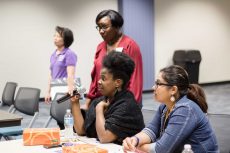By Raegan Scharfetter

Bogdan Sierra Miranda/The Collegian
Examining and handling breast cancer are major factors in survival, an oncologist told South Campus students Nov. 17.
In A Journey Through Breast Cancer, Dr. Robyn R. Young said women should practice a breast self-exam once a month to feel for irregularities and to get a mammogram annually to check for cancer.
“Signs and symptoms of breast cancer are the obvious lump in the breast or the lump under the arm, and then you’ve got the change in the shape or the size of the breast,” she said.
To examine any abnormal tissue, doctors will recommend a biopsy, and a diagnosis could take up to two weeks. Young said those in that situation should eat healthy, exercise, talk to their support group and meditate/pray during the waiting period to help with anxiety and stress.
“Waiting on the biopsy report for many of my patients, they tell me that is the hardest part of this whole journey,” she said.
Young said survival is full of mixed feelings. There is fear of access to the oncology team and fear of recurrence. Survivors also have difficulties learning to decipher symptoms.
“Sometimes when people get this diagnosis, they are so focused going from mammogram to biopsy to surgery, that it just doesn’t really sink in all the way,” she said. “So we reassure patients that that’s normal.”

